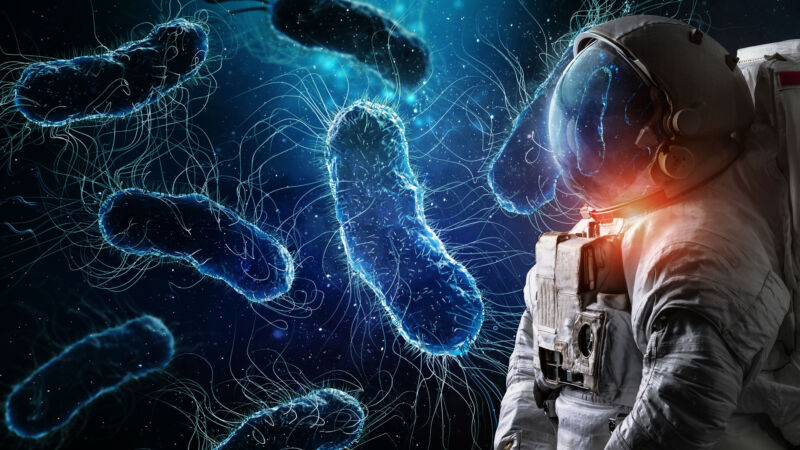Online News
Inner space in outer space —
How might space travel change the human microbiome, which is linked to so many ailments?
Doug Johnson, Undark Magazine
–

Aurich Lawson | Getty Images
Space poses some massive dangers for humans, from black holes to the heat death of the universe. But as humanity considers long-haul space travel, there are other, smaller potential hazards that some researchers say may deserve more attention: microbes from Earth.
Astronauts face numerous known health problems in space, including a loss in bone density, muscle atrophy, and psychological issues. And on Earth, researchers are increasingly discovering how the various bacteria and other microorganisms that live inside and outside of people — the human microbiome — affect physical and mental health.
Space, of course, is an entirely different environment from Earth, with high radiation levels and microgravity. Although the science is far from certain, these vast differences may cause unexpected changes in the microbiome of astronauts. In turn, this could result in a range of health problems, which may be more pronounced on long-haul stints in space, like traveling to another planet.
Still, the implications of a disrupted microbiome are poorly understood, even on Earth, said David Pearce, a bioscience researcher at Northumbria University and author of a 2022 paper exploring how a trip to Mars might affect microbes in the gut—which makes the range of related illnesses and diseases in space difficult to predict. And direct research is limited because only around 600 people have ever been to space. Those who have taken the trip don’t typically stay long, as the average length of a trip to the International Space Station is about six months. And some researchers aren’t yet convinced there’s enough evidence suggesting the human microbiome will change much in space at all.
All the same, many researchers, including Pearce, are trying to figure out whether or not astronauts will enter a state in which their microbiome changes in adverse ways, called dysbiosis. “Because they’re going to be away for a long time, will that dysbiosis become a significant problem,” he said, “or lead to them having health impacts that impair their ability to function?”
Researchers try to understand the possible effects of space on the microbiome in two places: terrestrial settings that are similar in some way to those experienced in space, or in space itself. In an example of the former, Norberto González-Juarbe, a principal investigator with the astronaut microbiome research group at J. Craig Venter Institute’s Infectious Diseases and Genomic Medicine Group, is looking at the microbiomes of researchers who work in the Concordia and Neumayer stations in Antarctica. He said that these locations mimic, in part, what astronauts experience in space, particularly the darkness, confinement, and limited human contact.
The team plans to analyze samples from the researchers at these stations to see how the microbial composition of their gastrointestinal tracts changes, and how their immune systems react to the space station-like conditions. According to González-Juarbe, early results show shifts in gut microbes, and the team is currently looking at the immunological data. He expects to publish the results by the end of this year.
As for studies conducted in space, there are a few. One 2019 study, for instance, compared the microbiomes of astronaut Scott Kelly and his twin brother, Mark, after the former went to the ISS for nearly a year starting in 2015. The study posited that Scott Kelly’s microbiome did indeed change in space. For him, this included a reduction in bacteria called Bacteroidetes, the dysregulation of which has been linked to neurological, immune system, and metabolic issues, as well as increase in Firmicutes, a type of bacteria that can help break down certain starches and fibers.
In 2019, another study from the J. Craig Venter Institute looked at nine astronauts who spent between 6 and 12 months on the ISS. The astronauts collected samples from various patches of their skin, noses, and tongues. The astronauts also collected stool, blood, and saliva, along with samples from various surfaces in the station and its water reservoir.
Back on Earth, the study authors extracted and sequenced the DNA from the samples to see how the astronauts’ microbiomes changed over time. The study found that various skin microbes, including types of Gammaproteobacteria, decreased in number, which the authors theorize could contribute to the common phenomenon of rashes and skin hypersensitivity among astronauts in space. The findings also suggested that the astronaut’s gastrointestinal microbiome changed, and that two types of bacteria — Akkermansia and Ruminococcus, which seem to play important roles in maintaining mucus integrity in the digestive tract and in breaking down carbohydrates — saw a five-fold decrease.

0 Comments :
Post a Comment